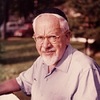Yosef Hayim Yerushalmi (1932–2009)
Author of Zakhor: Jewish History and Jewish Memory
About the Author
Image credit: from Columbia University Archives, found at New York Times website.
Works by Yosef Hayim Yerushalmi
Freud's Moses: Judaism Terminable and Interminable (The Franz Rosenzweig Lecture Series) (1991) 109 copies
From Spanish Court to Italian Ghetto: Isaac Cardoso : A Study in Seventeenth-Century Marranism and Jewish Apologetics (1971) 34 copies
The Lisbon Massacre of 1506 and the Royal Image in the Shebet Yehudah (Hebrew Union College Annual: Supplements) (1976) 15 copies
"Diener von Königen und nicht Diener von Dienern" : einige Aspekte der politischen Geschichte der Juden ; Vortrag geh (2013) 4 copies
SIGMUND FREUD'S JEWISH HERITAGE: The Purloined Kiddush Cups - Reopening the Case on Freud's Jewish Identity (1991) 1 copy
Associated Works
Order of the Passover Haggadah in the holy language and with explanations in English (1995) — Contributor — 2 copies
Tagged
Common Knowledge
- Birthdate
- 1932-05-20
- Date of death
- 2009-12-08
- Gender
- male
- Nationality
- USA
- Birthplace
- The Bronx, New York, USA
- Place of death
- Manhattan, New York, USA
- Places of residence
- New York, New York, USA
Larchmont, New York, USA - Education
- Yeshiva University (BA|1953)
Columbia University (PhD|1966)
Jewish Theological Seminary (1957) - Occupations
- professor (Hebrew and Jewish History)
rabbi
historian
historiographer - Relationships
- Baron, Salo (teacher)
- Organizations
- Harvard University (professor of Jewish History and Sephardic Civilization)
Columbia University (professor of Jewish History, Culture and Society)
Center for Israel and Jewish Studies (Columbia University) - Awards and honors
- American Academy of Arts and Sciences
National Endowment for the Humanities Fellowship (1976)
Guggenheim Fellowship (1989)
Newman Medal for Distinguished Achievement (CUNY, 1976)
Dr. Leopold Lucas Prize (2005) - Short biography
- Yosef Hayim Yerushalmi was born in the Bronx, New York City, to Yiddish-speaking Russian Jewish immigrant parents. His father was a Hebrew teacher.In 1953, Yerushalmi received his bachelor’s degree from Yeshiva University. Four years later, he was ordained as a rabbi at the Jewish Theological Seminary of America, and afterward served as rabbi of a synagogue in Larchmnont, New York. He went on to earn a doctorate in history from Columbia University in 1966. He devoted his life to academia and the scholarly study of Jewish history and historiography. His many books included Israel, The Unexpected State (2005); The Lisbon Massacre of 1506 (1976); Zakhor: Jewish History and Jewish Memory (1996), which won the National Jewish Book Award; Haggadah and History: A Panorama in Facsimile of Five Centuries of the Printed Haggadah (1975); and From Spanish Court to Italian Ghetto (1971). He was elected a fellow of the American Academy of Arts and Sciences, among numerous other professional honors. In 2005, he received the Dr. Leopold Lucas Prize from the University of Tübingen, Germany.
Members
Reviews
Awards
You May Also Like
Associated Authors
Statistics
- Works
- 17
- Also by
- 1
- Members
- 543
- Popularity
- #45,916
- Rating
- 4.2
- Reviews
- 6
- ISBNs
- 45
- Languages
- 9











